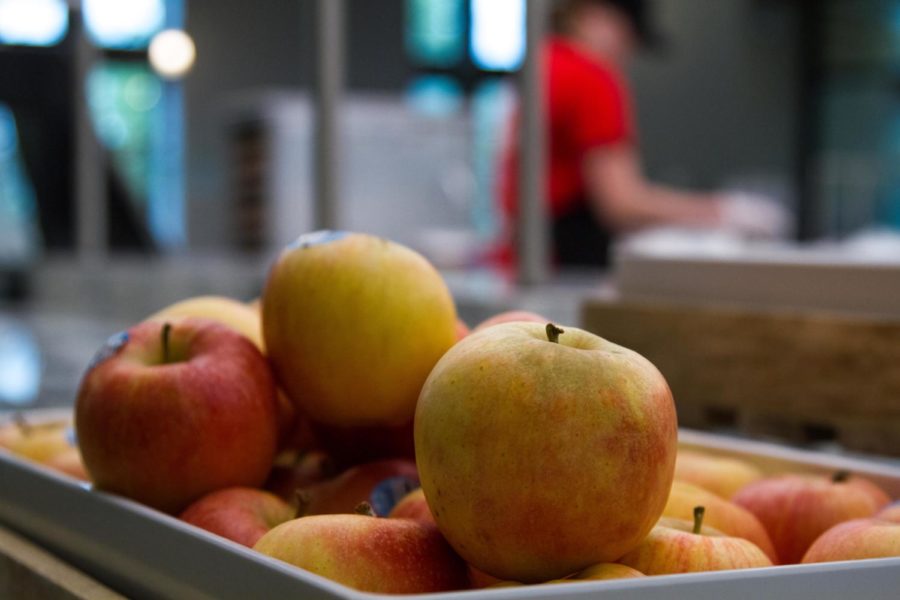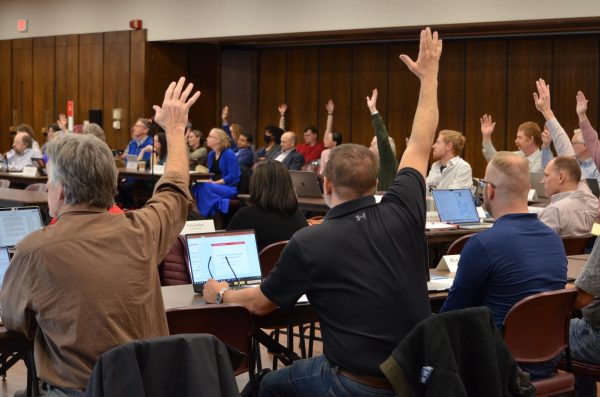Health inspectors give violations to four campus dining centers
Apples sit near the dessert bar in the new dining center, Friley Windows on Aug 21.
Union Drive Marketplace (UDM), Seasons Marketplace, Friley Windows Marketplace and Knapp-Storms received violations from the Iowa Department of Inspections and Appeals for soiled utensils and improper meat temperatures, among others, in inspections conducted earlier this year.
Tori Tafoya, a quality assurance specialist for campus dining services, said it is almost unheard of for there to be a perfect inspection and that inspections are just a snapshot of daily operations.
“These big dining facilities have so many working parts, so many pieces of equipment and so many people,” Tafoya said. “I mean, they [inspectors] even quiz the staff; they asked staff about recordable illness symptoms, and so it’s not a simple process.”
According to inspection documents, violations are sorted into two categories: foodborne illness risk factors and public health interventions; and good retail practices.
At UDM, an inspector found “visibly soiled” slicers in the main kitchen and salad bar, dented cans, hamburger meat held nearly 10 degrees Fahrenheit lower than the required 135 F and thawing raw fish in the packaging. Improper hot holding temperatures was a repeat violation from the last inspection in 2020.
At Season’s an inspector recorded a “visibly soiled” meat slicer and can opener, several dented cans, tortellini salad 4 F higher than the required 41 F and no signage in the restroom.
At Knapp-Storms, a culinary support center, an inspector observed a “visibly soiled” slicer, whisk and can opener and a lack of a handwashing sink in the donut prep area, catering area, cart section and oven prep area. Visibly soiled utensils were a repeat violation from the last inspection in 2020.
At Window’s, an inspector stated two scoops and one serving spoon in the clean utensil area had visible food debris and a dough baller in the pizza dough prep area had a visible build-up of food debris, and a manager stated it had not been used on the date of the inspection.
The Iowa Department of Inspections and Appeals Communications Director Stefanie Bond stated in email communications with the Daily that while inspections are not conducted on a pass-fail basis, inspectors can address the violations on-site.
“For example, if the inspector finds food that hasn’t been stored at the correct temperature, they will work with the facility to make sure the food is safe to eat by cooling or reheating the food or discarding it,” Bond stated. “If a facility poses an immediate health hazard, the facility can be closed until the hazard is eliminated.”
Bond also stated that violations that can cause foodborne illnesses must be resolved within 10 days of the inspection and that if an issue cannot be resolved during an inspection, the inspector will work with the facility to mitigate the hazard and conduct a follow-up inspection to ensure the facility is in compliance.
Nearly all of the violations were immediately corrected during the inspection by a manager, and three locations had no violations in “physical rechecks” weeks later. Windows was inspected on Wednesday and has not undergone a physical recheck. Windows’ and Season’s visibly soiled utensils were not marked as immediately corrected but were issued a fix-by date.
For all violations issued by the inspector, the dining centers were issued guidance documents so that they might fall into compliance with code.
Associate Professor in Hospitality Management and State Extension Specialist for Retail Food Safety Anirudh Naig stated over email with the Daily that establishments must work with management and line-level workers to assess where lapses have happened and figure out what corrective actions are needed.
“These violations can be potentially dangerous because they can cause harmful foodborne pathogens to multiply to unsafe levels, and when that food is consumed, it can make people sick, and in some cases, death can occur,” Naig stated.
According to Tafoya, there has not been a foodborne illness linked back to ISU Dining.
“We have not had a foodborne illness outbreak; we have not had anybody come back to us and say, ‘Here’s the proof that I got sick at your establishment,’” Tafoya said.
ISU Dining Director Christian Wise said that the health inspector will deem a utensil visibly soiled if an employee is in the middle of putting food into a cooler.
“If someone is not actively using a piece of machinery, like for instance, they’ve just sliced 50 pounds of ham [and] they’re putting the ham away,” Wise said. “They haven’t cleaned it yet, and [if the] health inspector is here and the machine’s dirty, that’s visibly soiled. So, that’s what I mean by this is a snapshot of what’s happening.”
Wise and Tafoya also said they are not argumentative with health inspectors.
“No, if he says that it’s visibly soiled and then we can see that there’s something on it, I don’t try to talk our way out of it,” Tafoya said. “We say, ‘Yes, thank you.’”
Wise and Tafoya both agreed that the violations were not indicative of their overall health and safety operations.
Wise also said the violations are just a “snapshot” of daily operations and their Hazard Analysis and Critical Control Points (HACCP) plan ensures food safety.
“All managers and supervisors are ServSafe certified, which is a national sort of certification process that involves a minimum of eight hours of instruction,” Wise said. “One of the things that we do to supplement it is that every year we have annual trainings to make sure people are remembering terminology, remembering Critical Control Points and remembering their processes.”
Your donation will support the student journalists of the Iowa State Daily. Your contribution will allow us to purchase equipment, send our student journalists to conferences and off-set their cost of living so they can continue to do best-in-the-nation work at the Iowa State Daily.













